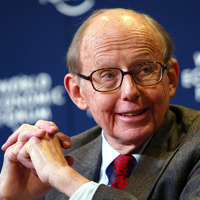Last weekend I attended a seminar on "Liberty and Responsibility in the Major Works of Samuel P. Huntington." The participants included former Huntington students, such as myself, as well as academics and independent scholars interested in his writings. Though it operated under Chatham House rules, meaning that participants' contributions were off the record, the seminar served as a useful reminder of Huntington's prolific genius and of the continued relevance of his work.
Like many Harvard professors, Huntington was active in both real world politics and academia. He was an early New Deal supporter, advised several Democratic presidents and became a "Jackson" Democrat -- named after those Democrats who, led by the late Sen. Henry "Scoop" Jackson, combined moderate domestic politics with hard-line national security policies.
As a scholar, Huntington saw his mission as defending America's key institutions and core liberal principles of limited government, individual liberties, constrained majority rule and free-market economics from various contemporary threats. He saw these threats as ranging from domestic challenges like McCarthyism and multiculturalism to external ones such as Soviet communism and WMD terrorism.

